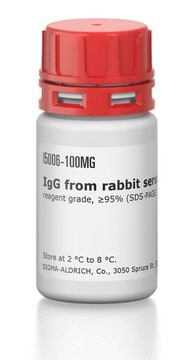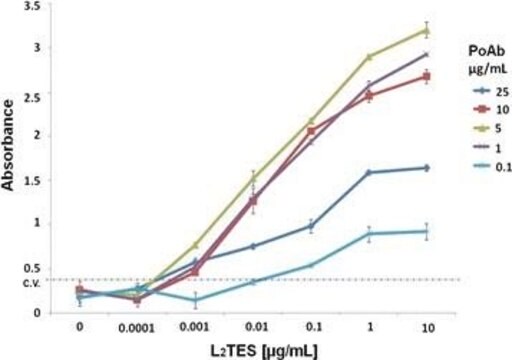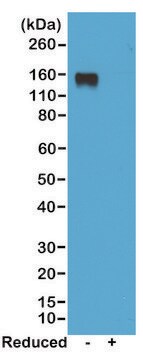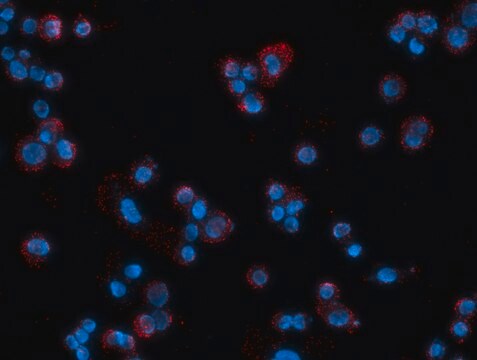M4434
Anti-Mouse IgG2a (heavy chain specific) antibody produced in goat
affinity isolated antibody, lyophilized powder
Autenticatiper visualizzare i prezzi riservati alla tua organizzazione & contrattuali
About This Item
Prodotti consigliati
Origine biologica
goat
Livello qualitativo
Coniugato
unconjugated
Forma dell’anticorpo
affinity isolated antibody
Tipo di anticorpo
secondary antibodies
Clone
polyclonal
Stato
lyophilized powder
tecniche
Ouchterlony double diffusion: suitable
Temperatura di conservazione
2-8°C
modifica post-traduzionali bersaglio
unmodified
Cerchi prodotti simili? Visita Guida al confronto tra prodotti
Descrizione generale
IgG antibody subtype is the most abundant serum immunoglobulins of the immune system. It is secreted by B cells and is found in blood and extracellular fluids and provides protection from infections caused by bacteria, fungi and viruses. Maternal IgG is transferred to fetus through the placenta that is vital for immune defence of the neonate against infections.
Anti-Mouse IgG2a (heavy chain specific) antibody recognizes mouse IgG2a when tested against purified mouse IgA, IgG1, IgG2a, IgG2b, IgG3, and IgM, myeloma proteins.
Anti-Mouse IgG2a (heavy chain specific) antibody recognizes mouse IgG2a when tested against purified mouse IgA, IgG1, IgG2a, IgG2b, IgG3, and IgM, myeloma proteins.
Immunogeno
purified mouse IgG2a (myeloma protein).
Applicazioni
Anti-Mouse IgG2a (heavy chain specific) antibody is suitable for Ouchterlony double diffusion.
Applications in which this antibody has been used successfully, and the associated peer-reviewed papers, are given below.
Enzyme-linked immunosorbent assay (1 paper)
Enzyme-linked immunosorbent assay (1 paper)
Stato fisico
Lyophilized from 0.01 M sodium phosphate, 0.015 M sodium chloride, pH 7.2.
Esclusione di responsabilità
Unless otherwise stated in our catalog or other company documentation accompanying the product(s), our products are intended for research use only and are not to be used for any other purpose, which includes but is not limited to, unauthorized commercial uses, in vitro diagnostic uses, ex vivo or in vivo therapeutic uses or any type of consumption or application to humans or animals.
Non trovi il prodotto giusto?
Prova il nostro Motore di ricerca dei prodotti.
Codice della classe di stoccaggio
11 - Combustible Solids
Classe di pericolosità dell'acqua (WGK)
WGK 3
Punto d’infiammabilità (°F)
Not applicable
Punto d’infiammabilità (°C)
Not applicable
Dispositivi di protezione individuale
Eyeshields, Gloves, type N95 (US)
Scegli una delle versioni più recenti:
Possiedi già questo prodotto?
I documenti relativi ai prodotti acquistati recentemente sono disponibili nell’Archivio dei documenti.
I clienti hanno visto anche
Hiwa Karimi et al.
Reproductive toxicology (Elmsford, N.Y.), 69, 196-203 (2017-03-13)
A study using a mouse IVF model was conducted to examine the hypothesis that in vitro fertilization (IVF) treatment may lead to immune system alteration in the offspring. Phagocytic activity and lymphocyte proliferative responses to mitogen, alloantigen, and purified protein
Roselind S Lam et al.
Journal of immunology (Baltimore, Md. : 1950), 193(5), 2349-2362 (2014-07-30)
The role of the macrophage in the immunopathology of periodontitis has not been well defined. In this study, we show that intraoral inoculation of mice with Porphyromonas gingivalis resulted in infection, alveolar bone resorption, and a significant increase in F4/80(+)
S Hashira et al.
Pediatrics international : official journal of the Japan Pediatric Society, 42(4), 337-342 (2000-09-15)
Maternal immunoglobulin G (IgG), transferred across the placenta to the fetus during intrauterine life, is an important component of the neonatal immunological defence mechanisms against infection. There is controversy with respect to differences in placental transfer of the different IgG
Il team dei nostri ricercatori vanta grande esperienza in tutte le aree della ricerca quali Life Science, scienza dei materiali, sintesi chimica, cromatografia, discipline analitiche, ecc..
Contatta l'Assistenza Tecnica.








